A shared vision with GM Active to encourage more people to be more active in pursuit of better health, wellbeing and fitness makes The Great Outdoor Gym Company Activate Ltd a logical Strategic Business Partner for us.
The Great Outdoor Gym Company Activate Ltd (TGO Activate) has been pioneering outdoor fitness equipment, safety standards, and technology on a worldwide stage since 2007.
It says it is proud to put community health and sustainability at the core of the business and that’s the reason it does what it does.
Here, TGO’s co-founder and joint Managing Director, Georgie Delaney MBE, discusses why the business has joined our Strategic Business Partner programme and gives us an insight into how she sees our partnership benefiting both parties, the population of Greater Manchester and ultimately the planet.
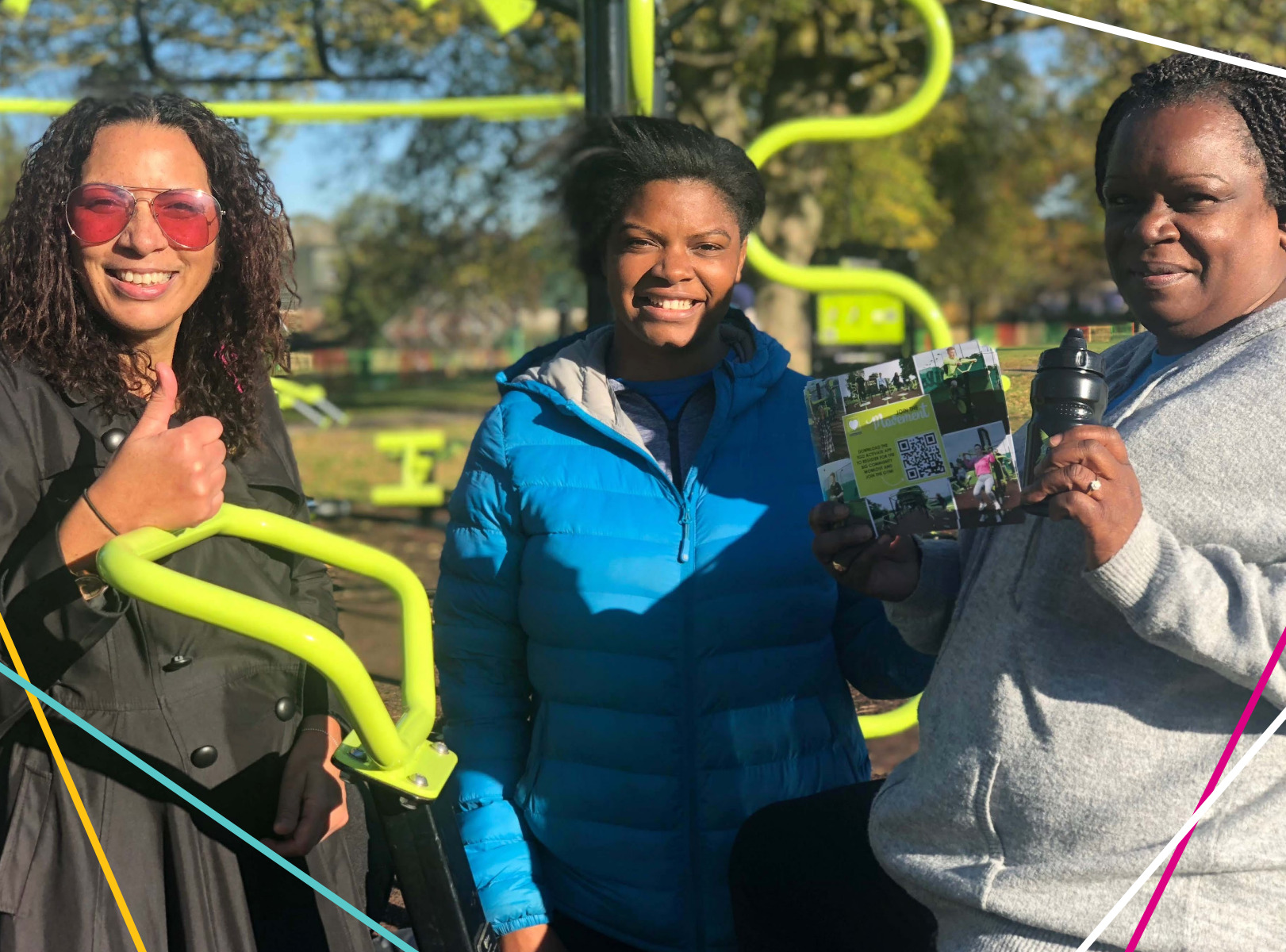
Greater Manchester with the city of Manchester at its core is renowned for its sporting prowess and while that is important to us, we are also great admirers of the whole momentum to get the population of the city-region moving by increasing the levels of physical activity.
We feel Greater Manchester is a really good fit with TGO because our mission has always been to get people more active and healthier via our outdoor gyms that are free to use and accessible due to their locations in local parks.
We work with cities worldwide, including Singapore, Hong Kong, and London and we very much feel like Manchester’s potential for outdoor gyms is untapped.
We first found out about GM Active, and the Manchester moving momentum, through one of our non-executive directors, who has been following developments here for a long time and it was he who pointed out the synergy between TGO and what’s happening in GM.
So far, I would say we are at the start of our journey.
We’re hoping to bring a different perspective to GM Active, which is all around local parks and how you can use these open spaces to provide an alternative and, most notably, a low cost opportunity to get more people, more families, engaged in physical activity.
We are also great supporters of the growing trend of calisthenics – a form of exercise that dates back to the ancient Greeks that uses a person’s body weight. The exercises include things like pull-ups, chin-ups, push-ups, crunches, and burpees. It became really popular during lockdown and the trend has carried on growing.
Another area we’ve been really developing over the last few years is what we call movement medicine, working with physiotherapists to develop the movement medicine gym. It can be used in healthy hearts classes, stability classes and in a programme called Move Type 2, which is tailored towards people who are prediabetic or have diabetes and are managing it.
It’s interesting to see how these programmes use our equipment and how you can blend different worlds together and create something that’s good for a variety of different needs.
We have many, many examples of what we’ve already achieved on our website, where we feature case studies as exemplars of what we can do.
I definitely feel like we can bring family-friendly activity to the parks with a high quality leisure facility in open spaces.
We have a higher aspiration about what we can actually do with outdoor gym set-ups and doing it really well by spending a bit more than is normally spent on outdoor gyms. Our philosophy as a company is making our outdoor gyms inclusive and safe for all users, which is why we were asked to set a British standard for this type of equipment.
It is sometimes hard to find activities to do as a family – that’s why McDonald’s is so successful! But we can change that by creating something that is a quality time experience for the whole family in the parks, where they can be together. I think more parents are wanting to do more fitness and so to do it as a family is a win for all.
It’s great to create an environment whereby the whole family can get active together. An outdoor gym environment is a different opportunity to develop, so I feel like we can help everyone think outside the box to help achieve GM Active’s goals, but in an outdoor environment as well as indoors.
We’d like GM Active to help us get some blueprint projects off the ground that are really going to be showcases not only for Greater Manchester but for the UK and for the world – we very much have a vision of healthy people, healthy planet.
The way we want to achieve this is to empower local populations to run the gym in the park, not only running fitness sessions, but perhaps having little picking and other activities in and around the gym that the whole family can do together that will get people moving but also gets people looking after the parks.
One of our core values is inclusivity, encouraging everyone – men, women, children, young people, older people to all get involved.
We’d like GM Active to work with us on establishing a show site and supporting us with the activation so that it’s properly executed by benefiting from GM Active’s experience to help us develop a model that is scalable to help other communities.
Championing more active lifestyles across Greater Manchester to create a healthier population is admirable, so too is its Pivot to Active Wellbeing to encourage the use of publicly run leisure facilities and services to support those living with long term-health conditions.
If you want to know more about The Great Outdoor Gym Company, head to their website here.
Britain is facing a health challenge of unparalleled proportions, according to a tsunami of reports, publications and commentaries.
They highlight the issues and make recommendations on what needs to be done to address the failing health of our population and the challenges faced for 21st century healthcare, which include:

As forerunners in improving population health, the principle of coaching people to improve their health is really relevant to everyone here at GM Active. It is one of our potential strengths as opposed to the clinical model of prescribing drugs and expecting people to follow that method of treatment alone.
The UK & International Health Coaching Association (UKIHCA), as the first and leading professional body for health coaching in the world, is so deeply concerned that Britain is missing a solution that could make a huge difference in turning the tide on chronic disease, it has written a White Paper setting out the case for health coaching in creating a healthier, happier Britain.
GM Active is pioneering a pivot to active wellbeing, part of which is to encourage our workforce to bridge the gap between health and activity. And while our workforce might not become health coaches in the exact context of how UKIHCA define health coaching, we think there is a place for health coaching as they define it, within our programmes.
Find out more about our Pivot to Active Wellbeing below:
Your heart is the most important organ in your body but over time, poor lifestyle choices can cause wear and tear and lead to serious health problems like heart attacks, strokes, angina and vascular dementia – all known as cardiovascular disease (CVD).
Our Pivot to Active wellbeing is at the cutting edge of a huge impetus to immerse our leisure facilities and services in the fight for healthier, more active lifestyles to improve population health.
Indeed, the Manchester Evening News was the first to give the pivot some mainstream publicity by highlighting the great work being done by our colleagues at Be Well in Wigan, spreading the word about their basic health checks, while at the same time, telling the stories of two local people, Mike Walker and Linda Richardson, who have been using the Robin Park Leisure Centre for rehab after each suffering a heart attack.
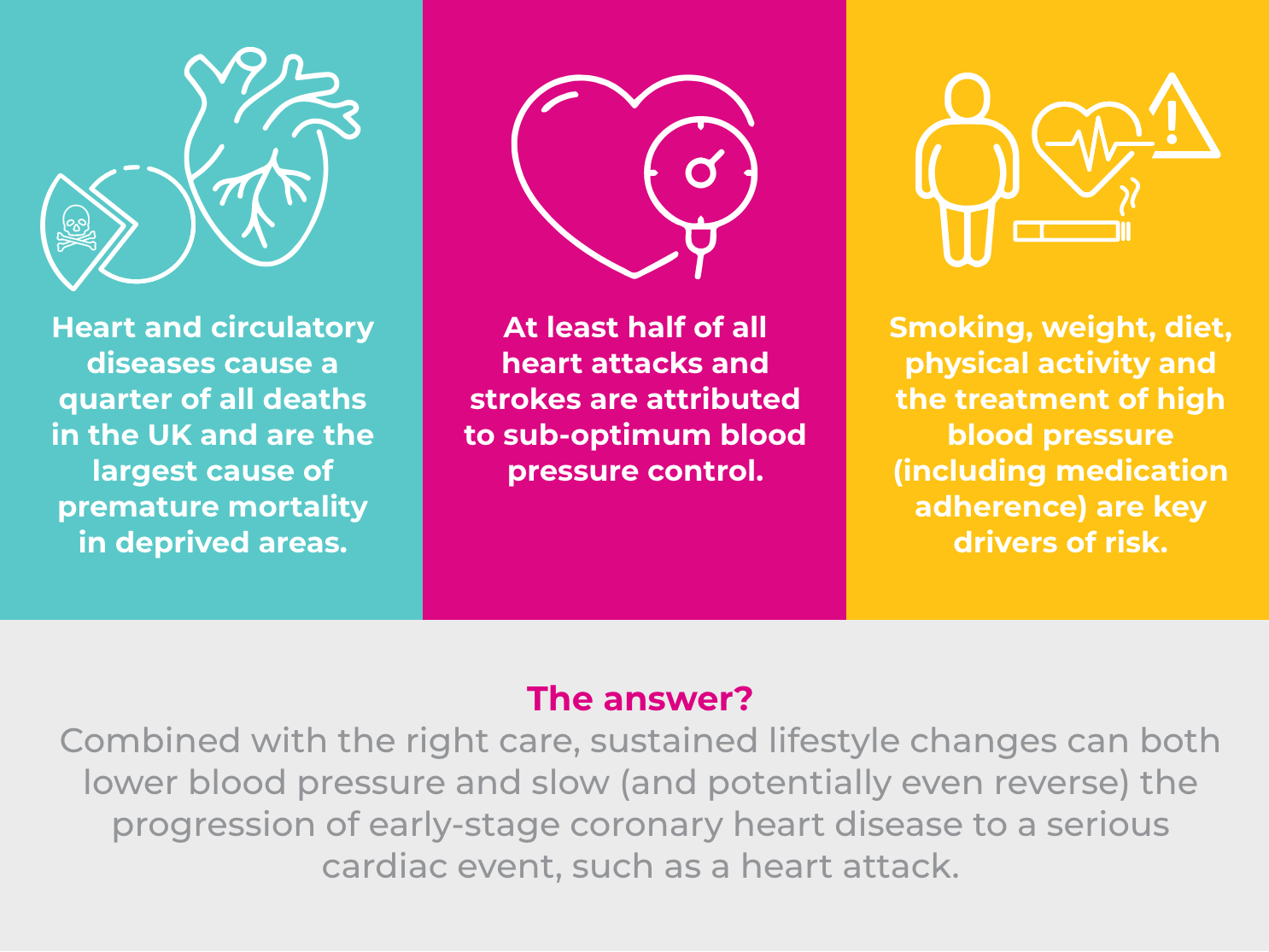
Meanwhile, NICE (the National Institute for Health and Care Excellence) is recommending stroke victims undergo three hours of rehab a day, every day – there’s another opportunity for our sector to step in as a key rehab provider.
That has been the focus of a feature in HCM magazine, in which our Chair, Andy King, made the case for offering a community-based approach to stroke rehab, via health clubs and leisure centres, that can provide a more flexible and accessible solution to address many of the issues associated with clinical settings (lack of staff, restrictive opening times etc).
It was timely, then, that our board members and strategic business partners heard from Momenta, a leading developer of behaviour change programmes, when its CEO Harry MacMillan gave us plenty of food for thought at our December 2023 meeting.
There are around 7.6 million people living with heart and circulatory diseases in the UK – twice as many as those living with cancer and Alzheimer’s combined.
Momenta Newcastle delivers CVD programmes directly for NHS England and local councils. Momenta programmes are also delivered across the UK by many public, private and charitable partner organisations.
They spread the good news that there are lots of things people can do to limit wear and tear on the heart and the health issues that can cause.
At the heart (no pun intended) of Momenta’s drive for better heart health is the Momenta Heart Health Check, whereby participants receive a FREE personalised heart health report, illustrating the impact lifestyle could be having on their heart health while showing how key, day-to-day changes can help to make a difference.
Momenta’s Heart Health Check has eight questions and is in two parts:
Most questions can be answered yes or no and there’s guidance for those answering don’t know. With all answers collated, a personalised report is compiled along with the relevant advice about lessening the chances and/or impact of CVD.
Heart and circulatory diseases cause a quarter of all deaths in the UK and are the largest cause of premature mortality in deprived areas.
Up until now, the focus of the NHS focus has been on identifying disease with less support after a diagnosis.
Momenta has identified the future need to cater for large numbers of CVD sufferers with a high need for support.
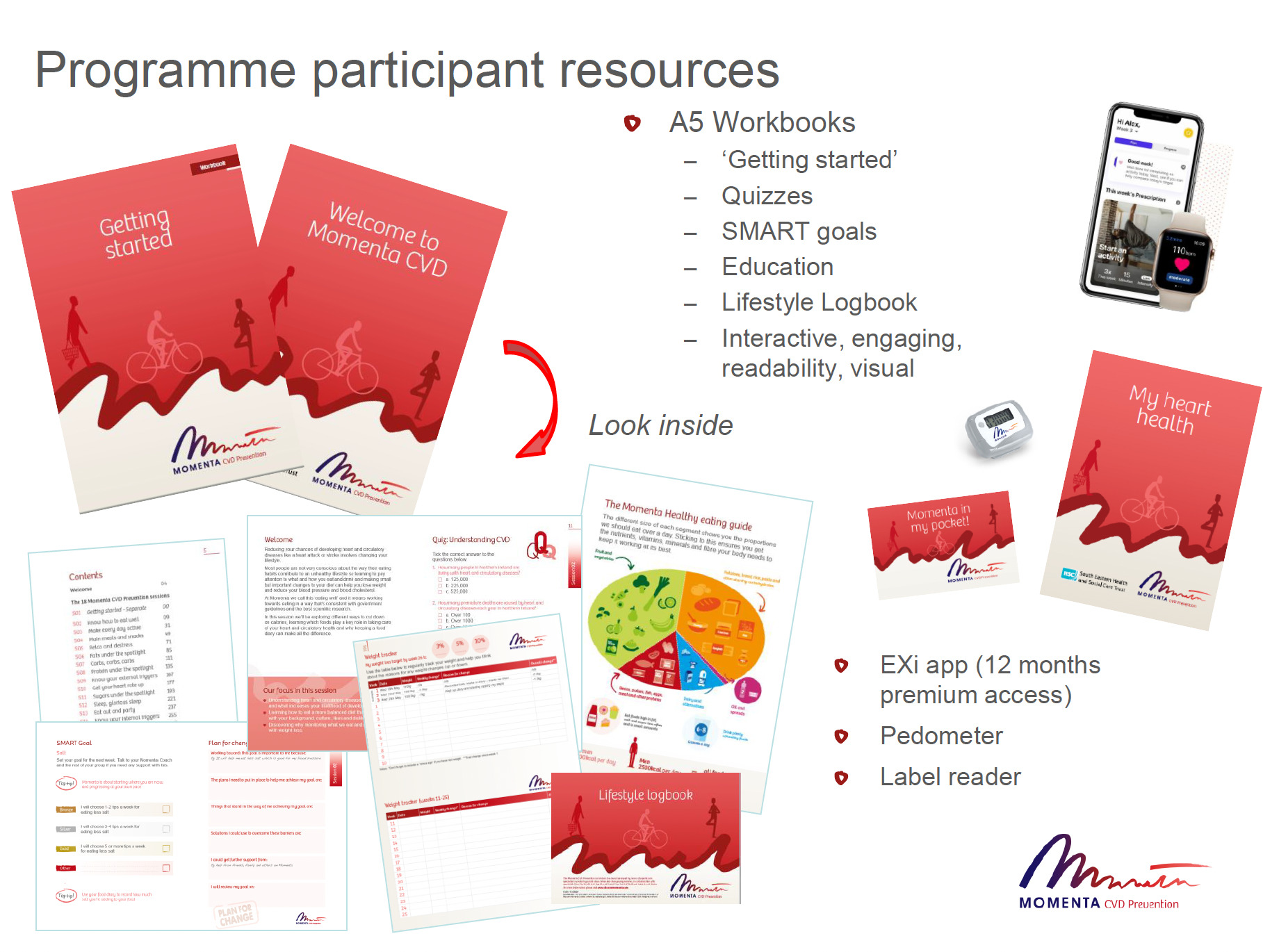
The Momenta Heart Health Check is one facet of Discover Momenta, a leading developer of evidence-based, outcome driven, healthy lifestyle solutions.
It designs, delivers, licenses and continuously improves services to help people negotiate the many day-to-day challenges they face in living healthier lives. It supports public, private and third sector commissioners, clients and partners to deliver world-class behavioural interventions in the heart of local communities.
It boasts a world-class core team and leading experts in their fields. For example, its CVD work is led by Dr Paul Chadwick, Clinical and Health Psychologist and Honorary Senior Associate Professor in Behaviour Change at University College London.
The high quality outcomes can be delivered directly or licensed and supported.
In addition to heart health, Momenta has acquired a leading reputation as an NHS provider nationally on diabetes prevention and has developed the first national framework on diabetes in remission.
Momenta’s Heart Health Check programme is a zero-cost way for operators to demonstrate they can make a quantifiable difference to the health of their members and their local population.
Here are some of the other benefits:
Momenta can deliver a CVD programme virtually with no training or license cost and no need to find fitness coaches etc.
We are pleased to announce that we have strengthened our affiliation with CIMSPA – the Chartered Institute for the Management of Sport and Physical Activity.
Searchers on CIMSPA’s organisation directory will now find GM Active CIC listed as an employer partner in the member and partner portal, providing a brief outline of our mission and vision.
CIMSPA is the professional development body for the UK’s sport and physical activity sector, committed to shaping a recognised and respected sector that everyone wants to be a part of.
It actively engages over 300 sport and physical activity sector organisations to create new partnerships with employers and education providers.
Mirroring those values of our own, CIMSPA’s partnerships represent a commitment to delivering high standards of professionalism, excellence and supporting the career development and prospects of our industry’s workforce.

CIMSPA’s workforce leadership has been recognised by government, national sports and education agencies, and the sector’s largest employers.
Our commitment to each other has been further strengthened by the appointment of Jon Keating, our Head of Business Operations and Company Secretary, to chair the newly created Local Skills Accountability Board (LSAB) for Greater Manchester.
A national network of LSABs is being pioneered by CIMSPA as part of its local skills delivery project. One of the first priorities will be to create a Skills Strategy and Action Plan for each area by bringing together local employers, education providers and relevant local and national partners.
The aim is to improve the conditions for, and ability of local operators to recruit, train, support and retain an inclusive, representative and skilled workforce for the physical activity and sport sector.
Jon’s appointment to the voluntary role is bolstered by the knowledge and experience he has garnered from our Pivot to Active Wellbeing – our ambitious change programme involving all local authority leisure operators across GM, evolving how local leisure centres, swimming pools, fitness facilities and services are perceived and used, and placing a bigger emphasis on mental and physical health and wellbeing as well as fitness.
And as part of the pivot, GM Active has pioneered a Transformational Leadership Programme, which is steering would-be leaders from being ‘fitness and facilities managers’ towards public health and wellbeing.
Three other key LSAB purposes that overlap with the Pivot to Active Wellbeing are to:
Jon adds: “While we are pleased our GM Active work already reflects some of CIMSPA’s aims, there is still more to be done; and improving talent recruitment and retention and improving career pathways is right at the top of the list.”
Our multi award-winning Prehab4Cancer (P4C) Programme run in partnership with GM Cancer, has added another accolade to its growing list of achievements.
It has won the innovation award at this year’s UKactive Awards, the fourth time the programme has been recognised for its pioneering work following two wins at the Health Service Journal (HSJ) awards and the patients’ choice award at the inaugural GM Cancer Awards.
P4C is offered to patients with lung, bowel and oesophagus-gastric (often referred to as upper GI) cancers and enables them to engage in exercise, nutrition, and wellbeing assessments and interventions before, during and after their treatment.
It has supported more than 3,000 patients across Greater Manchester since its inception 2019 and has since expanded into areas of Cheshire.

The UKactive judges applauded P4C ‘for being both important and revolutionary in delivering prehabilitation and recovery programmes for those managing a cancer diagnosis’.
P4C programme leader Jack Murphy says: “A cancer diagnosis can have a massive impact on a person, and increasing physical activity levels while waiting for cancer treatment is often the last thing on a person’s mind. But with physical activity and our support, people can take a proactive role in their own care and have a positive impact their outcomes.As a result, they feel empowered to take back control of the diagnosis, whilst optimising their physical and mental condition to better cope with the rigours of cancer-related treatment. We can’t always control what life throws at us. However, we can control how prepared we are to face these life events and physical activity can be a key to this.”
Independent research that secured recurrent funding for the Greater Manchester scheme found that P4C hospital patients were able to be discharged home sooner and enjoyed a better recovery.
Headline results for colorectal patients included:
The shorter hospital stays ‘released’ 550 ward beds days and 146 critical care bed days, resulting in increased capacity and patient flow. Bed days ‘released’ from 1,000 colorectal prehab patients enables 179 additional patients to access timely surgery. Bed days ‘released’ per prehab patient cover the costs involved in setting up and delivering P4C for a year.
Patients experienced fewer post-operative complications and enjoyed a better recovery when assessed against four efficacy benchmarks: the commonly used six-minute walk test to measure aerobic capacity and endurance; the World Health Organisation Disability Assessment Schedule (WHODAS); the International Physical Activity Questionnaire (IPAQ) and the descriptive system for health-related quality of life, known as EQ5D.
Speaking after P4C won Best Not for Profit Working in Partnership with the NHS award from the Health Service Journal (HSJ), Dr John Moore, P4C’s clinical director of prehabilitation and recovery, said: “Prehab4Cancer is now seen as an exemplar for prehab, and how we do it.
“We work with colleagues in Northern Ireland, Scotland, the north of England, Canada, Australia, and America, all because of the work we have done in this part of the world. To be able to say we represent Greater Manchester on a UK and international footing is absolutely phenomenal.”
The strategy now is to extend the prehabilitation principle to more cancers, with a 10-year ambition to be treating up to 10,000 patients a year. This could grow the workforce up to 40 Level 3 exercise instructors and 40 Level 4 exercise specialists.
Prehab 4 Cancer is a co-designed transformation programme between GM Active and GM Cancer. What began as a test project in 2019 has now secured the recurrent funding to safeguard its future.
GM Active is a collective of 12 leisure and community organisations across Greater Manchester all sharing the same vision – to get more people physically active so they can live healthy, happy and longer lives. It is a not-for-profit community interest company (CIC), which manages the majority of publicly owned leisure and physical activity services on behalf of the 10 local authorities in Greater Manchester.
You can read more about our P4C programme here.Change is not easy to achieve. It takes time, it takes patience, and, above all, it needs buy-in from those who will make the difference.
Those words very much sum up our Pivot to Active Wellbeing and its current status, writes Jon Keating, GM Active Head of Business Operations and Company Secretary.
If you’re late to the party, a quick synopsis: at the beginning of 2023 we began our Pivot to Active Wellbeing project across Greater Manchester, but in truth our ‘pivot’ began well before then.
Ultimately, the ‘pivot’ is about a shift of focus for public sector leisure, it’s about reimagining what’s possible to enable our facilities, our services, our people to collectively become a trusted partner with others across the system to deliver physical activities to benefit population health for all.
I’ve already written about the need to move the elephant in the room in order to achieve a coming together of our own sector and colleagues in healthcare, a challenge championed by Dr Kristen Hollands of our Active Academic Partnership with Salford University, who provides a compelling argument that ‘team science’ can resolve the pivot’s echo chambers.
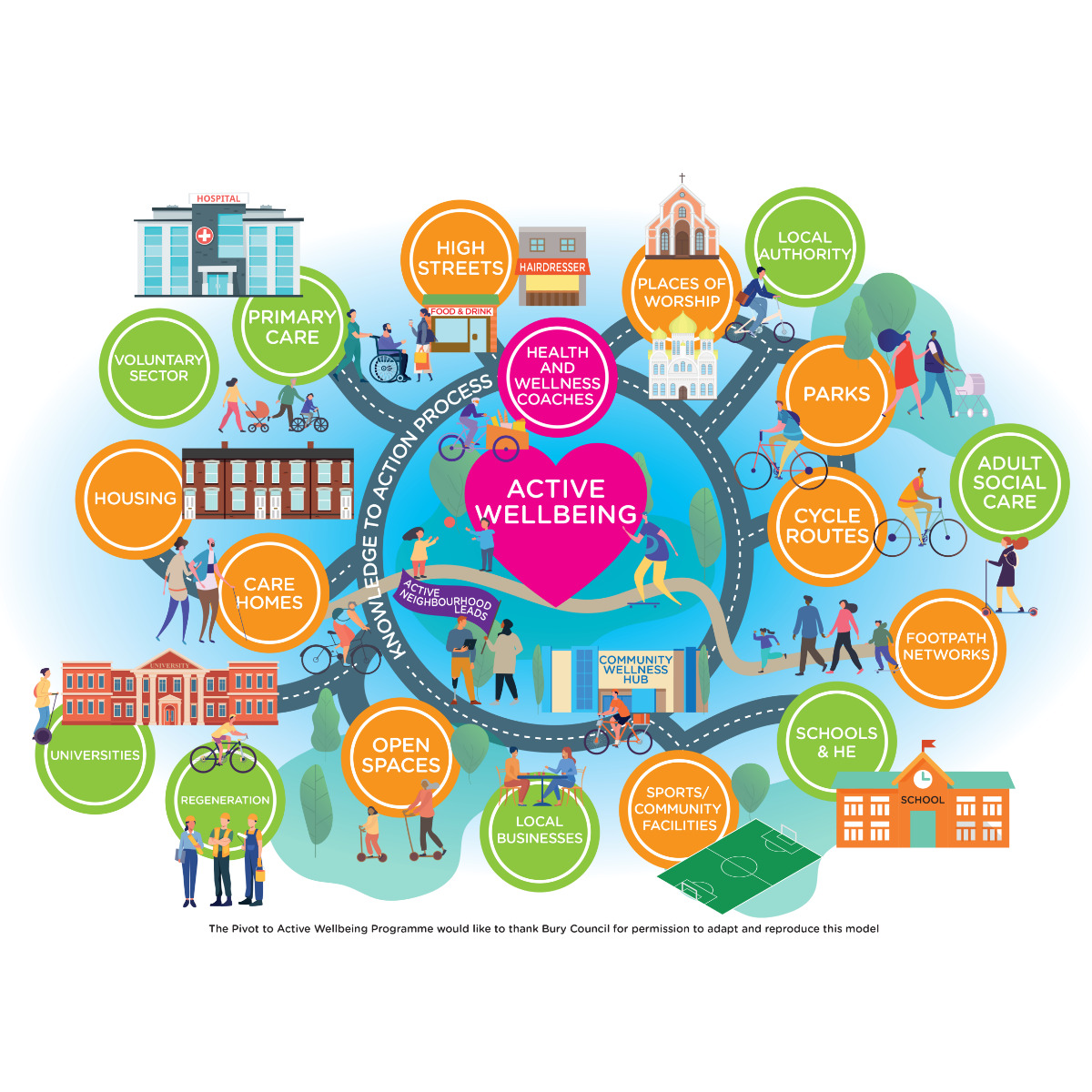
Here at GM Active, a collective of 12 leisure trusts across Greater Manchester that manage the majority of publicly owned leisure and physical activity assets on behalf of the 10 local authorities, the first impact has been to revise our vision.
Simply put, we exist to ‘collectively improve the health of the population across Greater Manchester’.
We must say thanks to all 10 local authorities, Sport England and GM Moving for the resources that allows this project to come to fruition.
Over 10 months, we’ve worked with consultancy partner SLC to work out the next stage of our adventure and we thank them for all the outputs agreed and received. We’re now into a space where Sport England, GM Moving and GM Active can decide on our next steps with this section of the project.
Energy benchmarking, facility designs (new and retrofit options), collaboration opportunities and much more are all now within our grasp to shape decisions and guide future strategic direction.
But what’s really clear is that our work with another pivot partner, Future Fit, to educate and upskill our workforce must be a long-term commitment.
Future Fit’s partnership manifests itself as our Transformational Leaders Programme (TLP), a training programme to develop our leadership skills and capabilities in order to achieve our vision.
What has become abundantly clear is the need for the full coalition of our collective’s 3,500 staff – and wider partners – across GM to understand, support and commit to the vision too.
I’m reminded of the famous quote about a cleaner at NASA: “What’s your job?” I’m helping to put a man on the moon!”
That mindset is what we need from everyone within our collective – to live and breathe that they are ‘helping to improve population health across Greater Manchester’ regardless of their role or title.
We have created and launched a digital induction, which is our first step in making that happen. In addition, our Aspiring Managers programme for shift supervisors, duty managers and those at site level are really important to help bring those changes within our centres and local place-based teams.
Our people are clearly at the heart of our vision.
University of Salford continue to work with us, to build the academic research and rigour we need to support the reimagining of our services. This section of the project for us is known as the Active Academic Partnership or AAP.
Arguably, none of what we are proposing here is particularly new. We’ve talked for years about the wonder drug that is physical activity and movement (even more so post-pandemic and its relevance not only to physical health, but to mental health too), but in reality, we’re trying to accelerate that shift, and redefine our purpose.
We need to stop using the word ‘leisure’ and move to ‘health’, ‘wellness’ and ‘wellbeing’ to become that trusted partner to the preventative health landscape. We need to encourage everyone to move more by listening to our communities, breaking down inequalities and ensuring we don’t take a field of dreams (build it and they will come) approach, but co-design programmes and services with and for the community.
Our reimagining of what our sector can achieve is nicely summarised in two bullet points and both are within our gift:
We have some strong case studies that University of Salford continue to look at in greater depth:
These give us essential insight of how to achieve successful programmes and services, providing clinical data and evidence along the way.
The word data popped up for the first time there. Data and insight is key to our pivot programme; hence our Digital Working Group has been reshaped and renamed recently to become our Data and Insight Group – a small and subtle change but important, nonetheless.
We know from AAP, and some of the other research already conducted, that the idea of our vision is broadly well accepted by our workforce coalition. However, there are some distinctive concerns around capacity and capability of our workforce.
Once again, it comes back to our people. Our investment in our people becomes a vital facilitator in making the vision a reality.
Our journey is still in its infancy, but our project partners SLC, Future Fit and University of Salford help us to learn and evolve. Our changes may be small and subtle for now, but we know the bigger changes and further work lay just around the corner.
We know that by reimagining our sector’s offer, purpose and language we can – and will – be in a strong place to be a trusted partner for preventative health and show we can support with curative services too.
I’ll finish with some key words that become more prevalent to us every day. Data, insight, people, partnerships, co-design, community, inclusive, equity and more besides.
This is evolution not revolution, but evolution takes time. But by building our library of resources and evidence we hope to accelerate that evolution and the reimagining public sector leisure services across Greater Manchester.
GM Active’s Head of Business Operations and Company Secretary, Jon Keating, reflected on an ‘elephant in the room’ moment when he attended Elevate 2023, the leading UK trade show focused on fitness, sport, and physical activity.
Consensus among those present was that the ‘fitness sector’ needed to ‘pivot’ to work with and support the health service.
The elephant in the room – quite literally writes Jon in his blog here – was that ‘leisure’ was there; but where was ‘health’?
Here, Dr Kristen Hollands, Senior Research Fellow at the School of Health and Society at the University of Salford, looks at why the two sectors largely operate in echo chambers and how the barriers can be broken down.
In our current ways of working, knowing better doesn’t support doing better. We need to change the way we create knowing, writes Dr Hollands.

Putting it simply, to achieve the pivot here in Greater Manchester, and anywhere else in the UK, it needs the ambition and aspiration not to be hamstrung by one peer group thinking it knows better than the other. Blunt but true.
We need to mesh our collective experience and expertise to realise the enormous potential health benefits of using physical activity within the health and care systems more.
Swathes of research evidence has led to physical activity being widely hailed as the panacea to manage and prevent many long-term health conditions. And yet, globally, very few people achieve the recommended levels of physical activity – Greater Manchester is no different.
If we know what to do, why aren’t we doing it?
We have a wealth of evidence that supports using physical activity to improve many aspects of quality of life and yet, so few people taking up this treatment suggests current evidence is in some way faulty. Research evidence and approaches thus far have failed to enable health and social care systems to take a holistic approach to increasing physical activity and realising the potential benefits on the management and prevention of long-term health conditions.
Are some of the biggest health challenges simply insurmountable without redefining how the research is done and who it is done by to move the concept towards faster, more acceptable and effective implementation?
The probability that someone will become physically active depends on several factors – just a few examples include:
Unpacking the extent to which each factor plays into an individual’s decision to take part in physical activity and what kinds of support works best to overcome the barriers would take hundreds of experimental comparisons and thousands of research participants to achieve the highest levels of rigour and certainty to inform how health and care services fund and provide physical activity to help manage and prevent long-term health conditions.
Furthermore, we need research to occur in the very places and involve the populations with the greatest need. This helps to make sure that knowledge generated through research is more likely to be implemented, its impact is more sustainable and occurs faster.
We suggest what is needed is a broader movement towards grassroots, big-team science: endeavours in which an unusually large number of people in many roles – not only researchers or clinicians – across organisations, sectors and regions, organise themselves to pool intellectual and material resources in pursuit of a common goal* – to live better through moving more.
In health research fields, this is known as TEAM SCIENCE. The team science approach is about pooling resources to tackle a shared, large-scale challenge, meshing different sources of knowledge on the basis of equality (rather than hierarchy of education vs lived experience and/or practice).
Alongside placing users at the centre of the conversation, it involves connecting research activity with delivery and implementation partners from the very outset. This helps ensure the complexity of the most important health and social care challenges is respected in the solutions that are generated. It helps speed up how knowledge from research is pulled through into practice on the ground..
The fact that many people do not achieve the recommended levels of physical exercise despite the known benefits reflects our poor understanding of the diverse and complex mechanisms that influence health behaviours.
Realising the potential of physical exercise to help people live better is a long-term investment requiring effort and co-ordination across the whole system. It cannot be solved or demonstrated with a simple single intervention, clinical trial, or primary outcome/singular key performance indicator (KPI), for example, health care savings.
It is a ‘perfect problem’ for a TEAM SCIENCE approach for several reasons:
In my experience, team science brings people together from all disciplines, backgrounds and experience, fostering a culture of mutual respect around shared goals. It could dispel some common myths.
Becoming physically active converts to health outcomes at population/health systems levels instantly – wrong!
It’s a long-term investment which needs the whole system to come together to do their bit, consistently over time.
For example, if someone attends a physical activity session in their local leisure centre but then goes home in the car, via the chippy while smoking, the physical activity alone won’t achieve the desired health outcome. We also need other parts of the system to support the opportunity to move more and to eat more healthily (quickly, cost effectively and enjoyably), and to restrict smoking.
Physical activity is a medication to be given under supervision and must come with the notion of prescribed levels to be worthwhile. That’s wrong too, as is the notion that unless people are active at guideline levels, it’s not worth doing, and/or activity is unsafe for some people with long-term conditions and needs to be supervised and at the ‘right dose’.
Instead, we must recognise many people will need to build up to the recommended ‘dose’ in healthcare terms or in exercise terms; we need to build up the fitness.
Supporting people to become more active and build towards guideline levels of what will help them realise health benefits can only be done by addressing the wider social factors determining health behaviours (ie: all those factors that affect people’s decision to be active or not).
Physical activity is NOT a pill to be prescribed for and overseen only by health professionals. It’s a way of life that many health and allied healthy lifestyle professionals and social carers need to support – we need many parts of the system to work together. It’s more about ‘support’ than ‘treatment’.
If our shared aim is to support everyone to live better through movement then the only way we will see more people being active is to change the way we currently provide support.
Often the issue of physical activity is seen as a behavioural change on the part of the person that needs to become more active. This way of thinking isn’t working – the vast majority of us do not achieve recommended physical activity guidelines. Everyone in the chain of physical activity provision and use needs to change their behaviour – this means you and me too!
To change the way, we provide support for physical activity means there are many layers of behavioural change that need to happen.
Healthcare professionals need to change their clinical practice behaviours to include conversations about physical activity and to refer to available physical activity services more.
People need support to overcome the social factors determining their health behaviours. For example, social prescribers and voluntary partners need to work alongside clinical referrals to help more patients take up the referrals they are offered.
And we need to offer opportunities for physical activity that support people to maintain levels for long enough to realise health improvements. Only then will we reap a return on investment via savings for the NHS at a population level.
As part of the Pivot to Active Wellbeing, we are prioritising spending time working with ALL stakeholders (decision-makers, providers and recipients) to agree a core set of KPIs that are closer to the behaviours and outcomes physical activity services actually have influence over (not only the headline NHS business outcomes that are long term and system-wide achievements/investments).
All of these things point to the idea that supporting people to move more is not the job of the healthcare system nor of the leisure sector alone.
We need many people in many different roles across the health and care systems and within the community to contribute to addressing the health challenge.
So, to address ’the elephant in the room’ and build our Move More Team Science, our Active Academic Partnership is bringing all the stakeholders together to make co-ordinated action and evidence necessary to help everyone live better through movement in three ways:
To achieve this, underlying conditions need to be in place:
Then, and only then, will two disparate elephant tribes come together to make one.
The phrase ‘elephant in the room’ sprang to mind when I attended Elevate 2023, the leading trade show in the UK focused on fitness, sport, and physical activity.
I’ve been in post as GM Active’s Head of Business Operations and Company Secretary for around 15 months now and as an industry I’ve heard lots of talk about how we need to transform our focus and terminology to reflect the much sought-after sector shift towards what we generally call ‘health’.
Our Pivot to Active Wellbeing project is well underway, and we continue to talk about connecting with health as part of the solution for the future of leisure (although it’s broadly accepted we need to stop using this word in favour of health, wellbeing and/or wellness).
This ‘pivot’ will enable the use of public sector leisure to support health with the offers available at 99 GM Active centres, or out in our communities utilising our coalition of 3,500 staff.
However, in those 15 months there’s only been a handful of occasions when ‘leisure’ and ‘health’ have been in the same room. The exceptions to this state of affairs have been our Prehab4Cancer model, and the Greater Manchester Combined Authority (GMCA) Falls Collaborative – where we’ve talked about strength and balance programmes that public sector leisure can provide as part of a falls prevention solution.
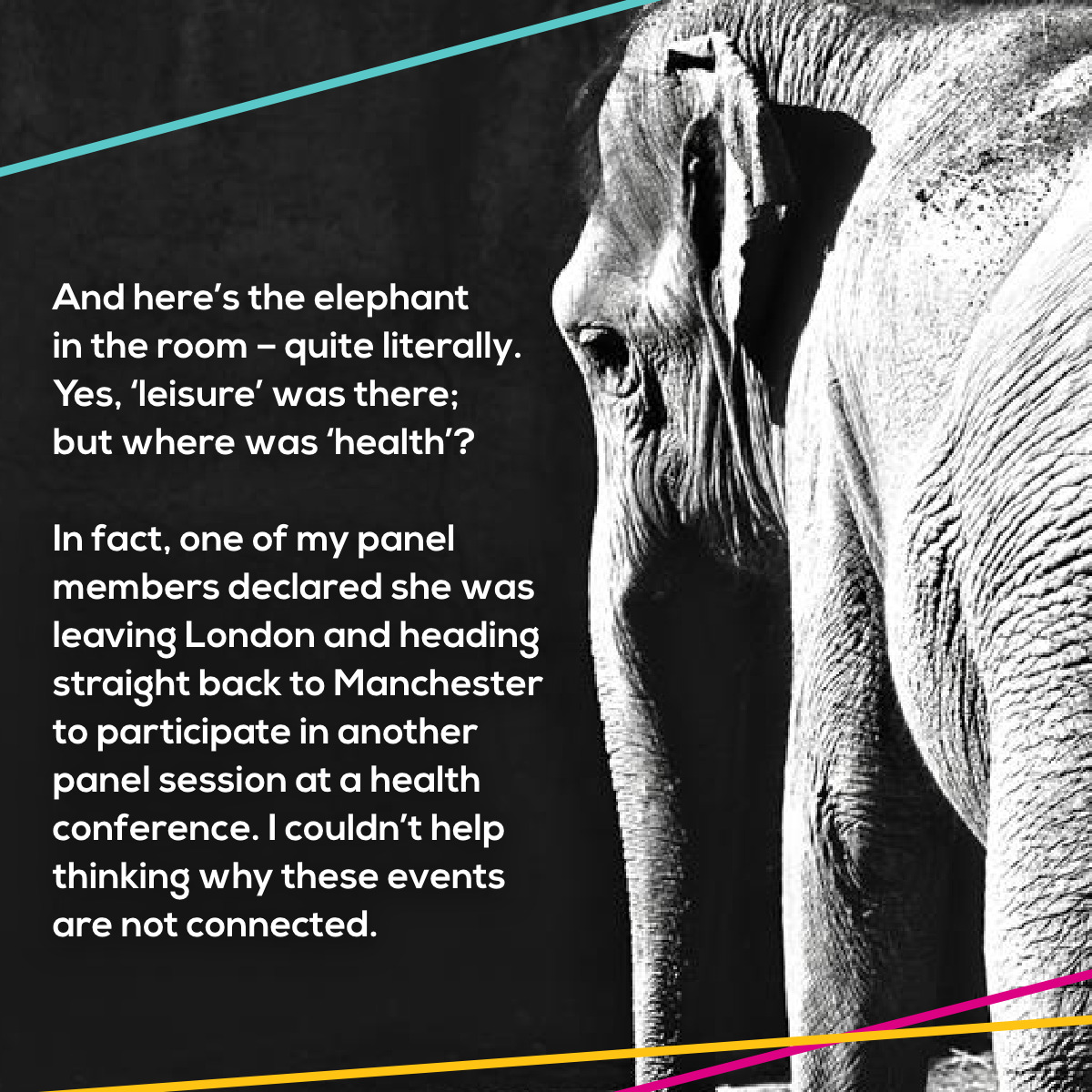

New to my role, I attended my first Elevate conference last year when the notion of ‘pivot’ was starting to gain momentum with lots of conversations taking place about connecting with health.
Twelve months later, a less ‘green’ version of Jon Keating was invited to lead a couple of panel discussions as part of Elevate 2023. I enjoyed the experience, the audience had certainly swelled and the noise around ‘pivot’ and connecting with health had grown significantly.
And here’s the elephant in the room – quite literally. Yes, ‘leisure’ was there; but where was ‘health’?
In fact, one of my panel members declared she was leaving London and heading straight back to Manchester to participate in another panel session at a health conference. I couldn’t help thinking why these events are not connected.
‘Pivot’ simply cannot happen without health partners being in the room. The whole ecosystem around Greater Manchester has taken almost a decade to evolve, so if we are to make an impact and a difference these connections need to be developed and amplified at the earliest opportunity.
I maybe seeing this simplistically, but it seems logical to me that an event focused on community health, preventing long-term health conditions, and supporting the NHS should be connected with the public sector leisure and fitness sector.
We need to broker these new relationships and partnerships. We need people in the same space and not one event happening in London whilst the other takes place in Manchester.
I really enjoyed this year’s Elevate and found time to discuss with Elevate Director Lucy Findlay what I saw as the next steps required and for ‘pivot’ to actually be realised.
On arrival at the Excel centre, I did have a wry smile to myself. Opposite the Elevate conference on the other side of the hall was a conference dedicated to renewable energ, one of our sector’s biggest challenges right now. Unsustainable energy costs are a reason for a number site closures (including in Greater Manchester). Is this another example of more connections being required?
But back to the pivot. Everyone in the room was clearly on board with the notion pivoting for the purpose of both preventative and curative solutions that our sector can (and already is on a small scale) able to provide. But we’re preaching to the converted, the majority of the event is from the same sector. I strongly believe in order to change the dial we need ‘health’ in the room.
Whilst I’m not an event organiser, and as the only employee of GM Active, I cannot put my head above the parapet to organise such an event.
But I do call on those who can challenge the status quo to look for collaborative event opportunities. My boss, GM Active Andy King, has said much the same in a recent LinkedIn post and many seem to agree. But the clock is already ticking.
I’ve benefitted hugely in relation to personal development, education and making connections at many national events over the last 15 months but I do wonder if they could be even more beneficial by having the right collaborations and connections.
My fear is without this that any conference in 2024 will see the same audience agreeing the same principles but with no tangible progress or actions taking place.
This is not a criticism, but rather my observations of improving future events, and ensuring the right relationships and partnerships can continue to grow. We need to shift the elephant – and fast!
From tiny acorns grow mighty oak trees!
The pandemic quickly followed by the cost-of-living crisis and spiralling energy prices have all combined to give our industry quite a battering.
So, it was with the weight of our industry weighing heavily on my shoulders that I embarked on a watershed moment (no pun intended) at Stockport’s Grand Central Pools to meet with key figures from Ofgem, the UK’s energy regulator, whose role it is to protect energy consumers, writes Jon Keating, GM Active’s Head of Business Operations and Company Secretary.
Given the Greater Manchester location, I’d been entrusted by colleagues at UKactive to help facilitate Ofgem’s fact-finding mission, which was led by Jonathan Brearley, CEO, Louise van Rensburg, Head of Non-Domestic Retail Policy, and Harry Booty, Senior Stakeholder and Communications Manager.
In light of the energy crisis this is a hugely important connection, not just across Greater Manchester but for our sector as a whole.
As high energy consumers – particularly those sites with pools – we need to do all we can to protect the sector against the risks of rising energy costs, and work tirelessly to achieve less reliance on fossil fuels and ensure sustainable and green energy solutions using the latest technology, are front and centre at all sites.
This is vital to mitigate against future rising costs and to control our own destiny.
Fact-finding: (left to right): Louise Van Rensberg, Ofgem’s Head of Non-Domestic Retail Policy, Jonathan Brearley, Ofgem CEO, John Matson, Head of Facilities, Life Leisure, and Jon Keating, GM Active’s Head of Business Operations and Company Secretary.
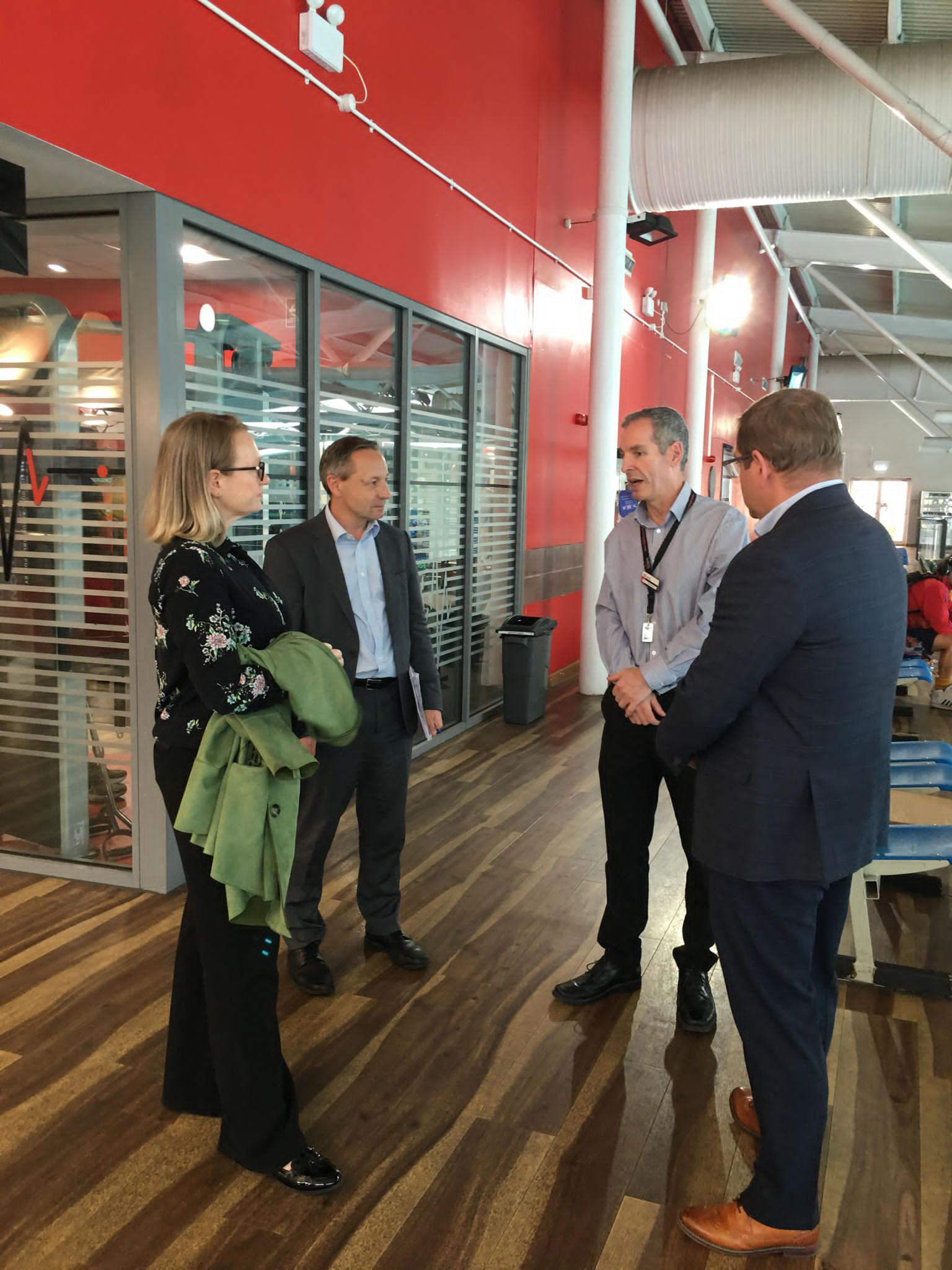
Without putting too light a spin on things, the pressure was on to make sure that on behalf of the whole sector I along with colleagues from Life Leisure (Stockport Active CIC) were able to present the risks and challenges in great detail.
I felt humbled and honoured that I was entrusted to do so on behalf of the industry.
Grand Central is a 50m pool and now 30 years old. It has seen significant challenges and rising costs during the peak of the energy crisis. For this site alone, utility costs are running at more than £1million per annum, and as with many facilities that raises the question of whether it’s actually sustainable without some sort of financial intervention – and that’s where connecting with Ofgem could be crucial.
I was joined on the site visit with colleagues from Life Leisure in Charlene Murphy, General Manager, and John Matson, Head of Facilities, who both did a stellar job pointing out all the risks and challenges of a volatile energy market and the impact of wholesale cost spikes.
We started discussions at the main pool, explaining why energy is needed 24/7, 365 days-a-year not only to keep the pool at the right temperature but to power the water and air filtration, lighting and much more besides. John in particular was able to point out all areas of high energy consumption.
We then moved into the gym, and again, we were able to point out lighting, gym equipment and all areas of significant energy usage.
In all the discussions Charlene, John and I were able to point to areas of retrofit solutions. What we also pointed out was that energy and cost saving technology solutions exist but often come at a high price, and as a sector still recovering from a pandemic, the cost-of-living crisis and high energy prices, we simply don’t have the capital to be able to invest in these solutions.
Finally, we moved into the plant room. Our Ofgem colleagues were blown away by the size of the plant room, and the sheer volume of equipment behind the scenes that’s needed to keep a centre such as Grand Central fully operational. As our Ofgem visitors stated, they doubted the general public has any idea what happens behind the scenes to keep the pool water clean and heated, air filtered, facilities lit and heated and much more besides.
Overall, I’m confident that between Charlene, John and I, we really highlighted the challenges and risks to the sector and made the visit of Ofgem a hugely beneficial one, with plans for follow-ups and next steps with UKactive.
Right: John Matson explains how the Grand Central boilers work to the Ofgem visitors.
Jonathan and Louise asked many searching questions all of which we were able to respond to between us. I also highlighted that a recent energy benchmarking exercise for Greater Manchester showed that if all publicly owned leisure sites were on the lowest tariffs there would be a £10 million cost saving, and if Ofgem can support us with anything it would be to help us to secure the best deals across the sector.
Louise in particular asked for the three key areas the sector needs help and support with in relation to energy. Our responses, starting with the most obvious:
That third point was a significant area I spoke to our Ofgem visitors about.
In the light of Our Pivot to Active Wellbeing project in GM, we must as a sector be part of a health, wellness and wellbeing solution across the country.
I was able to speak about our Prehab4Cancer programme and how this needs expansion, and how over time it can be expanded to other long term health conditions. I pointed out that as a sector we can offer both preventative and curative health solutions as a trusted partner to the ICB.
This in the context of energy is vital, and a key component of why our sector needs protecting from the volatile market and any future energy spikes should they occur again.
Huge thanks to Charlene and John from Life leisure, who did our sector proud, and thank you to UKactive for putting faith in me to carry out this task on our industry’s behalf. Here’s hoping we some benefit.